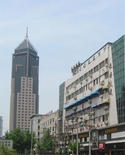Facebook‘s botched IPO reflects not only the weakness of the stock market, but a systemic misunderstanding of where the true value of technology lies. A website that, due to superior funding and media hype, allows people to do what they were already doing — connecting on the Internet — does not inherently drive broad economic growth, even if it mints a few high-profile billionaires. read more »
Facebook’s False Promise: STEM's Quieter Side Of Tech Offers More Upside For America
The Atlanta Transportation Tax: Too Much for Too Little
On July 31, voters in a 10 counties of the 28 county Atlanta metropolitan area will vote on whether to raise the sales tax by one cent for $8 billion in transit and highway projects over 10 years. The measure is highly tilted towards transit spending. Sadly, this would do virtually nothing to reduce Atlanta's traffic or its travel times. read more »
It Can Happen Here: The Screwed Generation in Europe and America
In Madrid you see them on the streets, jobless, aimless, often bearing college degrees but working as cabbies, baristas, street performers, or—more often—not at all. In Spain as in Greece, nearly half of the adults under 25 don’t work.
Call them the screwed generation, the victims of expansive welfare states and the massive structural debt charged by their parents. In virtually every developed country, and increasingly in developing ones, they include not only the usual victims, the undereducated and recent immigrants, but also the college-educated. read more »
Vermont: The Cost of Joining the Gentry Class
There’s nothing particularly modern about traditional rural gentrification. The English roots of successful upper-middle-class urbanites retiring to newly acquired country estates with large houses and small livestock flocks are 18th century or older. Perhaps its earliest American example is Alexander Hamilton’s flight from below-Wall-Street-New York City to the Haarlem that was then the farm country of northern Manhattan Island. read more »
Latin America’s Demographic Divergence
Increasingly, the debate over plummeting world birth rates is shifting to the developing world. This includes Latin America where on the whole rates are dropping quickly from 5.98 children per woman in 1960 to 2.20 children per woman in 2010. read more »
- Login to post comments
China's Top Growth Centers
Hefei, the capital of historically poor Anhui province emerged as China's top growth center among major metropolitan areas over the past 10 years. Metropolitan areas from the interior, the Yangtze Delta and the central and northern coast were the fastest growing, displacing Guangdong's Pearl River Delta, long the growth center for the country. (Figure 1).
China's Trends in Context: China's growth rate has fallen substantially and the United Nations has projected that the nation will experience population decline starting between 2030 and 2035. read more »
Declining Birthrates Key to Europe's Decline
The labor demonstrators, now an almost-daily occurrence in Madrid and other economically-devastated southern European cities, lambast austerity and budget cuts as the primary cause for their current national crisis. But longer-term, the biggest threat to the European Union has less to do with government policy than what is–or is not–happening in the bedroom. read more »
From Connection to Dispersal: Urbanisation in the 21st Century
Commentators have long studied connections between cities and how these influence their development. The city is the natural focus of trade-based theories of growth. Exporting a surplus, based on local resources and specialisation was – and is – considered the way to city wealth. read more »
Here Come the Plurals!
This month America’s destiny as a pluralistic democracy took a new and unprecedented turn. First, early in May, USA Today asked Americans what name they thought would be appropriate for the country’s newest generation now moving into grade school classrooms with its unique behavior and perspectives. Plurals is the name suggested by communications research and consulting firm, Frank N. read more »
Top Manufacturing Sectors For 2011
There has been lots of data indicating that domestic manufacturing is regaining some vigor after years of wasting away. Brookings’ Martin Neil Baily and Bruce Katz, writing in the Washington Post, noted:
Manufacturing employment, output and exports are headed in the right direction: In April, the number of U.S. manufacturing jobs was up 489,000 from the January 2010 low of 11.5 million. The Institute of Supply Management’s manufacturing index has shown 33 consecutive months of expansion.
read more »





















